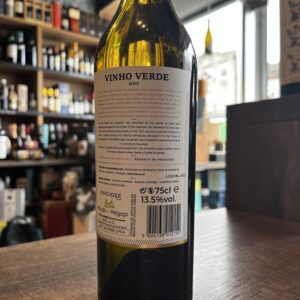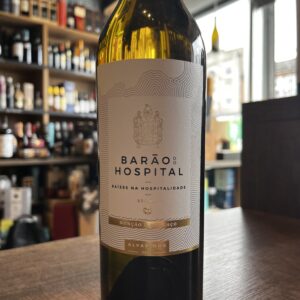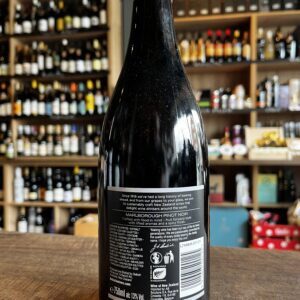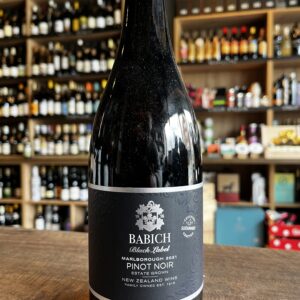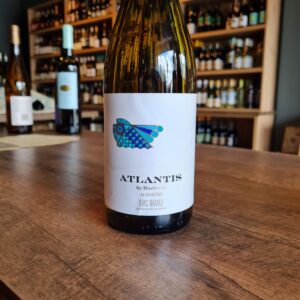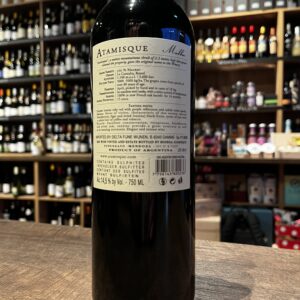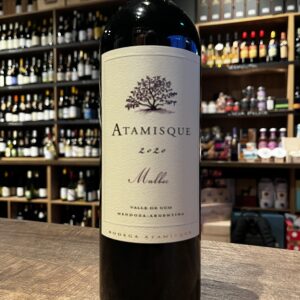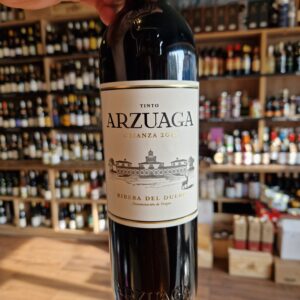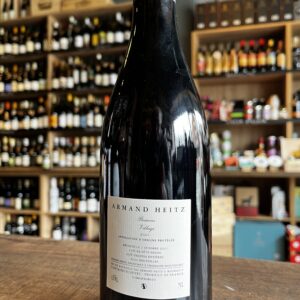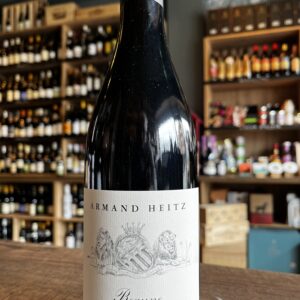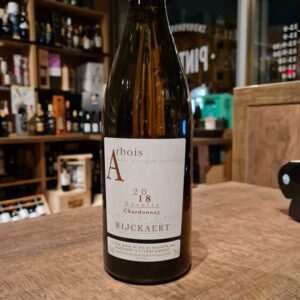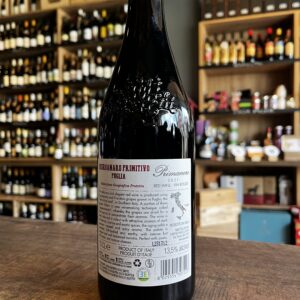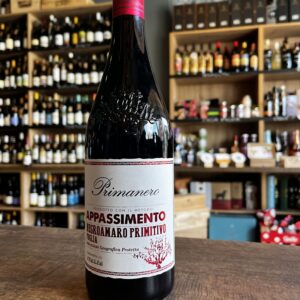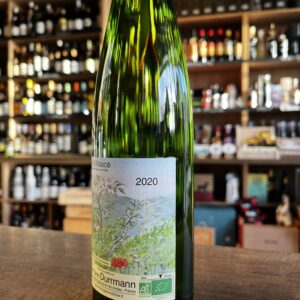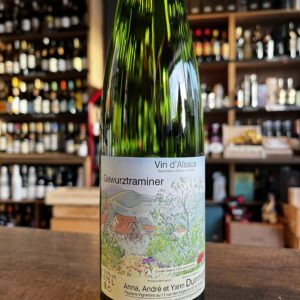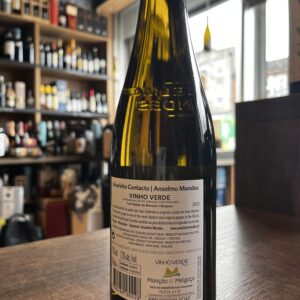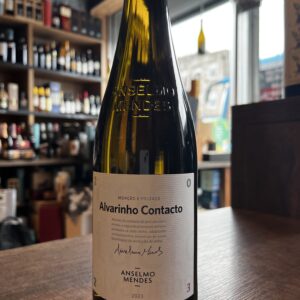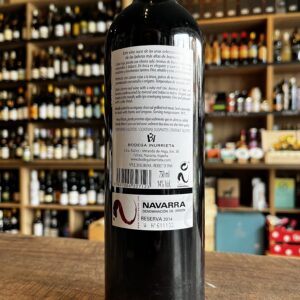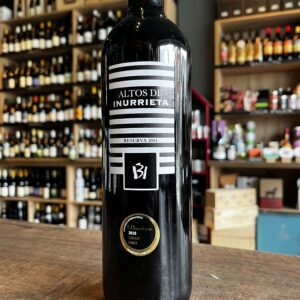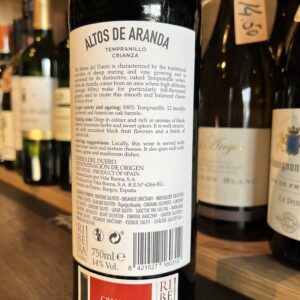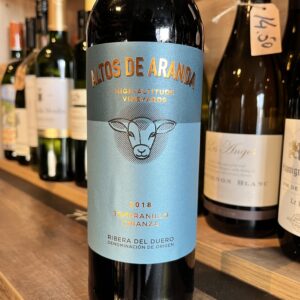-
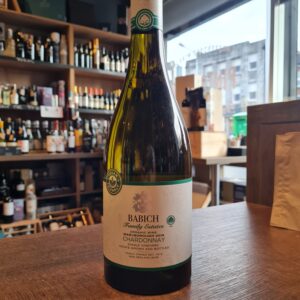 Family Estates Organic Marlborough Chardonnay; a complex style of Chardonnay grown in our Headwaters vineyard in Marlborough. The cooler climate and alluvial soils of Marlborough deliver flavour and varietal complexity that is reflective of the region and our winemaker’s commitment to sustainably crafting the most drinkable New Zealand wines in the world. This organic Chardonnay wine would go well with poultry or fish or vegetable medley.
Family Estates Organic Marlborough Chardonnay; a complex style of Chardonnay grown in our Headwaters vineyard in Marlborough. The cooler climate and alluvial soils of Marlborough deliver flavour and varietal complexity that is reflective of the region and our winemaker’s commitment to sustainably crafting the most drinkable New Zealand wines in the world. This organic Chardonnay wine would go well with poultry or fish or vegetable medley. -
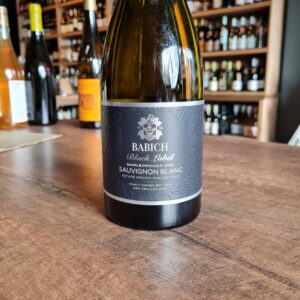 The Babich family hails from Croatia and first bought land in New Zealand in 1916. The winery is now in its third generation. Fruit for this wine comes from a variety of its estate-owned vineyards which are sustainable or organic. Most of the juice for this wine is fermented in stainless steel with a small percentage in old oak. Crafted with food in mind-weighty, ripe, tropical fruit, flavoured style, rich and rounded. Pair it with veal, seafood (oysters) or a chicken dish.
The Babich family hails from Croatia and first bought land in New Zealand in 1916. The winery is now in its third generation. Fruit for this wine comes from a variety of its estate-owned vineyards which are sustainable or organic. Most of the juice for this wine is fermented in stainless steel with a small percentage in old oak. Crafted with food in mind-weighty, ripe, tropical fruit, flavoured style, rich and rounded. Pair it with veal, seafood (oysters) or a chicken dish. -
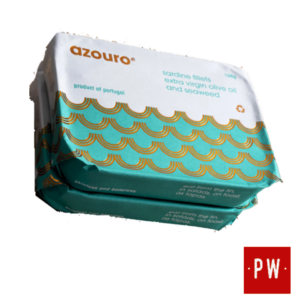 Award-winning sardines in extra virgin olive oil,on a bed of organic seaweed (Sea Lettuce & Bladderwrack). Combine to make an incredibly delicate taste, and umami flavour sensation. Our fish are rich in Omega-3 and an excellent source of protein. Prepared, canned, and packaged by hand in Matosinhos (fishing port), Northern Portugal, combining traditional Portuguese methods with modern technologies and the highest quality standards. Our fish is skinless, boneless, and ready to eat from the tin, in salads, on toast, or as tapas.
Award-winning sardines in extra virgin olive oil,on a bed of organic seaweed (Sea Lettuce & Bladderwrack). Combine to make an incredibly delicate taste, and umami flavour sensation. Our fish are rich in Omega-3 and an excellent source of protein. Prepared, canned, and packaged by hand in Matosinhos (fishing port), Northern Portugal, combining traditional Portuguese methods with modern technologies and the highest quality standards. Our fish is skinless, boneless, and ready to eat from the tin, in salads, on toast, or as tapas. -
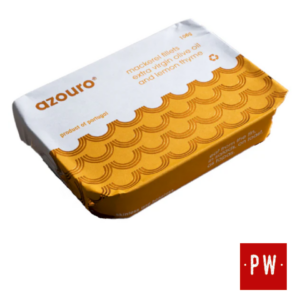 Azouro Mackerel fillets in organic extra virgin olive oil and lemon thyme. 100% pure and premium quality mackerel fillets in organic extra virgin olive oil and lemon thyme. Skinless and boneless. Ready to eat.Eat from the tin, in salads, on toast, as tapas. The freshest fish with the purest olive oil and a hint of lemon thyme (herb) combine to make an incredible taste and flavour sensation.A more interesting way to enjoy tinned fish!Rich in Omega-3 and an excellent source of protein.Canned and packaged by hand in Matosinhos (fishing port), Northern Portugal, combining traditional Portuguese methods with modern technologies and the highest quality standards.
Azouro Mackerel fillets in organic extra virgin olive oil and lemon thyme. 100% pure and premium quality mackerel fillets in organic extra virgin olive oil and lemon thyme. Skinless and boneless. Ready to eat.Eat from the tin, in salads, on toast, as tapas. The freshest fish with the purest olive oil and a hint of lemon thyme (herb) combine to make an incredible taste and flavour sensation.A more interesting way to enjoy tinned fish!Rich in Omega-3 and an excellent source of protein.Canned and packaged by hand in Matosinhos (fishing port), Northern Portugal, combining traditional Portuguese methods with modern technologies and the highest quality standards. -
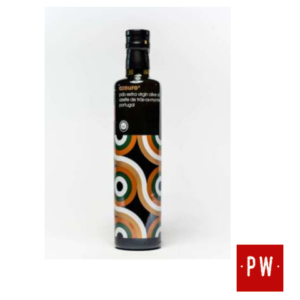 A premium quality oil created from a unique blend of the finest indigenous olive varieties – Verdeal, Madural & Cobrançosa.It has a balanced & harmonious flavour, with a fresh green fruity aroma and a precious golden green colour. There is a sweetness to the taste with notes of almonds, a medium peppery bite & an elegant lasting finish.
A premium quality oil created from a unique blend of the finest indigenous olive varieties – Verdeal, Madural & Cobrançosa.It has a balanced & harmonious flavour, with a fresh green fruity aroma and a precious golden green colour. There is a sweetness to the taste with notes of almonds, a medium peppery bite & an elegant lasting finish. -
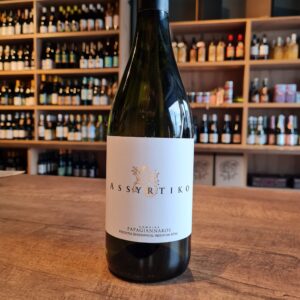 Founded in 1919, Domaine Papagiannakos is located in the Attica region of Central Greece, just 18 miles from Athens. Today, the winery is run by the 3rd generation, Vassilis Papagiannakos, who has issued a new era of modern winemaking while still maintaining the family’s dedication to cultivating and preserving the region’s most famous indigenous grape, Savatiano. In addition the Domaine has plant Malagousia and Assyrtiko. The Assyrtiko vineyards are located in northeastern Attica at an altitude of 330 feet. The vineyard has a northeastern facing exposure. The vineyard is farmed without irrigation, resulting in low-yielding vines that produce grapes with rich, concentrated fruit flavors. The limestone soil and the unique microclimate of the region produces wine with a very clean and crisp profile with citrus and white flesh aromas.The acidity is very well integrated into the wine and gives the ability for long aging. With aging the wine develops a beautiful mineral character. The refreshing character of the wine makes it an ideal accompaniment for seafood, fish, white meat, and Mediterranean cuisine.
Founded in 1919, Domaine Papagiannakos is located in the Attica region of Central Greece, just 18 miles from Athens. Today, the winery is run by the 3rd generation, Vassilis Papagiannakos, who has issued a new era of modern winemaking while still maintaining the family’s dedication to cultivating and preserving the region’s most famous indigenous grape, Savatiano. In addition the Domaine has plant Malagousia and Assyrtiko. The Assyrtiko vineyards are located in northeastern Attica at an altitude of 330 feet. The vineyard has a northeastern facing exposure. The vineyard is farmed without irrigation, resulting in low-yielding vines that produce grapes with rich, concentrated fruit flavors. The limestone soil and the unique microclimate of the region produces wine with a very clean and crisp profile with citrus and white flesh aromas.The acidity is very well integrated into the wine and gives the ability for long aging. With aging the wine develops a beautiful mineral character. The refreshing character of the wine makes it an ideal accompaniment for seafood, fish, white meat, and Mediterranean cuisine. -
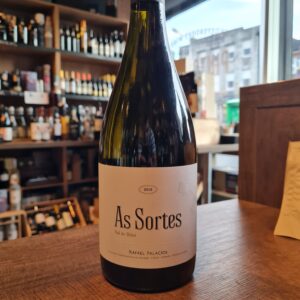 Rafael Palacios is the son of D. José Palacios Remondo (founder of Bodegas Palacios Remondo) and the brother of Alvaro Palacios(Priorat) but ultimately a passionate producer of white wine. After producing his first white at the family-run winery, called Plácet, he decided to set up his own winery in Galicia, in the Valle del Bibei, under the Valdeorras denomination. Established in 2004, Rafael Palacios has rapidly become one of Spain’s greatest producers of white wine. His focus is on the local variety Godello, grown in a small estate on very old vines that are up to 90 years old from the areas steep-sided, terraced vineyards and have been cultivated with respect of the land, without using any type of herbicide or pesticide. Rafael Palacios is refining his work year after year, reaching the magic of the greatest wines. A top wine, and one to keep. Grub pairing suggestions are mild Asian dishes, Moroccan specialities, fish ragout with saffron sauce Risotto ai frutti di mar
Rafael Palacios is the son of D. José Palacios Remondo (founder of Bodegas Palacios Remondo) and the brother of Alvaro Palacios(Priorat) but ultimately a passionate producer of white wine. After producing his first white at the family-run winery, called Plácet, he decided to set up his own winery in Galicia, in the Valle del Bibei, under the Valdeorras denomination. Established in 2004, Rafael Palacios has rapidly become one of Spain’s greatest producers of white wine. His focus is on the local variety Godello, grown in a small estate on very old vines that are up to 90 years old from the areas steep-sided, terraced vineyards and have been cultivated with respect of the land, without using any type of herbicide or pesticide. Rafael Palacios is refining his work year after year, reaching the magic of the greatest wines. A top wine, and one to keep. Grub pairing suggestions are mild Asian dishes, Moroccan specialities, fish ragout with saffron sauce Risotto ai frutti di mar -
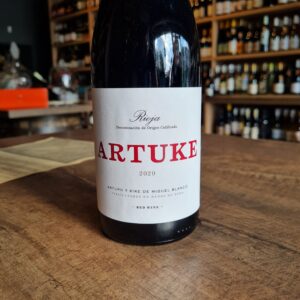 Made in a Beaujolais style, with the carbonic maceration method. This juicy ''Joven'' fresh fruited style of Rioja has zero oak influence as it ages in concrete tanks for 6 months. Farmed without any synthetic fertilizers or pesticides. Arturo Blanco was once asked what the philosophy at Bodegas Artuke was and he simply replied 'we are farmers'. The approach here is 100% focused on interpreting the family's 32 plots which are split between the villages of Baños de Ebro and Ábalos in Rioja Alavesa. Biodynamic techniques are employed in the vineyards and Arturo and Kike are also busy recovering old, ignored plots of ancient vines. Vinification is aimed at expressing the characteristics of the vineyard and quality of fruit above all else. The restrained use of oak and inclination towards different types/sizes of barrel, plus an unwillingness to adhere to the subscribed regimes for classification means that Artuke are precluded from using Crianza, Reserva and Gran Reserva designations on their wines. This mouth-watering red wine takes a relatively deep chill which makes it a versatile pairing with all types of food: tuna, pretty much anything made with zucchini, fried chicken, gooey cheese sandwiches, pizza, etc…
Made in a Beaujolais style, with the carbonic maceration method. This juicy ''Joven'' fresh fruited style of Rioja has zero oak influence as it ages in concrete tanks for 6 months. Farmed without any synthetic fertilizers or pesticides. Arturo Blanco was once asked what the philosophy at Bodegas Artuke was and he simply replied 'we are farmers'. The approach here is 100% focused on interpreting the family's 32 plots which are split between the villages of Baños de Ebro and Ábalos in Rioja Alavesa. Biodynamic techniques are employed in the vineyards and Arturo and Kike are also busy recovering old, ignored plots of ancient vines. Vinification is aimed at expressing the characteristics of the vineyard and quality of fruit above all else. The restrained use of oak and inclination towards different types/sizes of barrel, plus an unwillingness to adhere to the subscribed regimes for classification means that Artuke are precluded from using Crianza, Reserva and Gran Reserva designations on their wines. This mouth-watering red wine takes a relatively deep chill which makes it a versatile pairing with all types of food: tuna, pretty much anything made with zucchini, fried chicken, gooey cheese sandwiches, pizza, etc… -
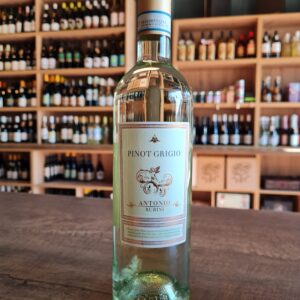 The Pinot Grigio grapes from this wine come from the Veneto (Pavia region, near Milan) region of Italy, where the Pinot Grigio grape has been cultivated for more than a century. The wine shows apple and pear with hints of white peach and elderflower. Light and refreshing, a mouth-watering partner for salads and seafood, great in the summer.
The Pinot Grigio grapes from this wine come from the Veneto (Pavia region, near Milan) region of Italy, where the Pinot Grigio grape has been cultivated for more than a century. The wine shows apple and pear with hints of white peach and elderflower. Light and refreshing, a mouth-watering partner for salads and seafood, great in the summer. -
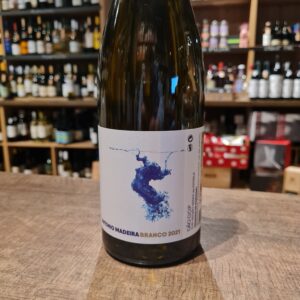
 António Madeira is a Frenchman with Portuguese roots who considers that the heart of Dão, one of Portugal’s most interesting wine regions, is in the Serra do Estrela, which is where he can trace his Portuguese roots back to. Madeira has been researching the area since 2010, and he has managed to rescue interesting vineyards with abandoned old vines growing an impressive number of native varieties. This is winemaking that dates back a long time, where the plots have special granite soils, a good altitude and sun exposure and they are cultivated with great care for the environment. All of these factors result in authentic wines, with an honest personality. An excellent return to origins.
António Madeira is a Frenchman with Portuguese roots who considers that the heart of Dão, one of Portugal’s most interesting wine regions, is in the Serra do Estrela, which is where he can trace his Portuguese roots back to. Madeira has been researching the area since 2010, and he has managed to rescue interesting vineyards with abandoned old vines growing an impressive number of native varieties. This is winemaking that dates back a long time, where the plots have special granite soils, a good altitude and sun exposure and they are cultivated with great care for the environment. All of these factors result in authentic wines, with an honest personality. An excellent return to origins. -
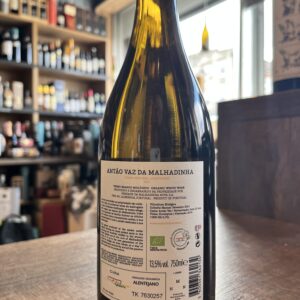
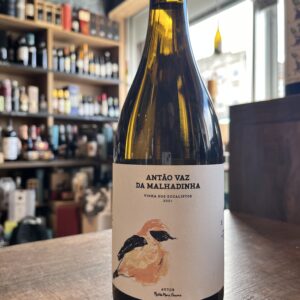 Herdade da Malhadinha Nova is the representation of an ambitious and innovative project of the Soares family, who have transformed a piece of Alentejo land, into one of the most beautiful and charismatic estates in the Alentejo. Located in Albernoa and currently possessing 80 hectares of vineyards, it is here that wines full of personality are created, whose labels are based on the children's drawings of their offspring. In addition to the focus on vines and wine, the estate is also farmed for olive groves and olive oil production, as well as rural and wine tourism activities.
Herdade da Malhadinha Nova is the representation of an ambitious and innovative project of the Soares family, who have transformed a piece of Alentejo land, into one of the most beautiful and charismatic estates in the Alentejo. Located in Albernoa and currently possessing 80 hectares of vineyards, it is here that wines full of personality are created, whose labels are based on the children's drawings of their offspring. In addition to the focus on vines and wine, the estate is also farmed for olive groves and olive oil production, as well as rural and wine tourism activities. -
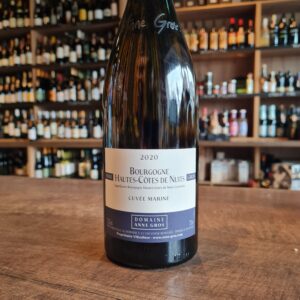 Anne Gros, the only daughter of François Gros, has established a solid character and reputation in the wine world after taking over her father’s domaine in 1988. At 25 years old, Anne saw the family domaine grow from 7 to 16 acres. Recently, she invested in a new cellar. She is a winegrower suspicious of certitude and fastidious about maintaining her freedom. As a woman winegrower, Anne knew how to prove herself and convince all who doubted of her ability to manage a domaine. She showed that she had not only the shoulders but the head to make her family heritage one of the greatest domaines of Burgundy. In 1984 she had to stop studying Arts to study vines’culture and oenology in Beaune and Dijon. Now her passion for vine and wine as well as her talent, sensitivity and professionalism posit her as a winemaker enthusiasts can rely on. Anne Gros has always been concerned about the environment, however she did not always find what she was looking for. so with this conviction, Anne Gros continued her approach to ecology without the recognition of organic certification The first harvest of this wine was 1999, Now the vines are mature and bringing very expressive fruit. This 4 acre single block parcel is situated in the commune of Concoeur just above the village of Vosne-Romanée. Originally bare of any vines, it was planted in stages (1996, 1997 and 1998). Chardonnay vines make up 2.4 acres on the upper part of the slope, where the earth is deeper and more humid (this is where the water of the hillside resurges). On the land itself: is an area rarely exceeding 300 metres in altitude in the west. the geographical diversity of burgundy leads to a diversity of climates and the existence of numerous micro-climates. the average annual insolation is 2000 hours, the average temperature is 11.5 degrees celsius. the côte de nuits is carved out of jurassic limestone. as its name suggests, the côte has a fairly steep slope. the clay-limestone complexes, the different sun exposures and the climatic data resulting from the shaping of the combes perpendicular to the fault line of the coast give us a very fragmented pdo classification system. Highly recommended with raw or grilled fish, shellfish in a court-bouillon, white meat, charcuterie without garlic and goat cheese. Fantastic Burgundy and not easy to find due to its limit production. Try it while you can
Anne Gros, the only daughter of François Gros, has established a solid character and reputation in the wine world after taking over her father’s domaine in 1988. At 25 years old, Anne saw the family domaine grow from 7 to 16 acres. Recently, she invested in a new cellar. She is a winegrower suspicious of certitude and fastidious about maintaining her freedom. As a woman winegrower, Anne knew how to prove herself and convince all who doubted of her ability to manage a domaine. She showed that she had not only the shoulders but the head to make her family heritage one of the greatest domaines of Burgundy. In 1984 she had to stop studying Arts to study vines’culture and oenology in Beaune and Dijon. Now her passion for vine and wine as well as her talent, sensitivity and professionalism posit her as a winemaker enthusiasts can rely on. Anne Gros has always been concerned about the environment, however she did not always find what she was looking for. so with this conviction, Anne Gros continued her approach to ecology without the recognition of organic certification The first harvest of this wine was 1999, Now the vines are mature and bringing very expressive fruit. This 4 acre single block parcel is situated in the commune of Concoeur just above the village of Vosne-Romanée. Originally bare of any vines, it was planted in stages (1996, 1997 and 1998). Chardonnay vines make up 2.4 acres on the upper part of the slope, where the earth is deeper and more humid (this is where the water of the hillside resurges). On the land itself: is an area rarely exceeding 300 metres in altitude in the west. the geographical diversity of burgundy leads to a diversity of climates and the existence of numerous micro-climates. the average annual insolation is 2000 hours, the average temperature is 11.5 degrees celsius. the côte de nuits is carved out of jurassic limestone. as its name suggests, the côte has a fairly steep slope. the clay-limestone complexes, the different sun exposures and the climatic data resulting from the shaping of the combes perpendicular to the fault line of the coast give us a very fragmented pdo classification system. Highly recommended with raw or grilled fish, shellfish in a court-bouillon, white meat, charcuterie without garlic and goat cheese. Fantastic Burgundy and not easy to find due to its limit production. Try it while you can


